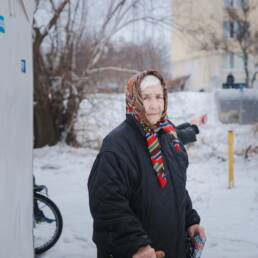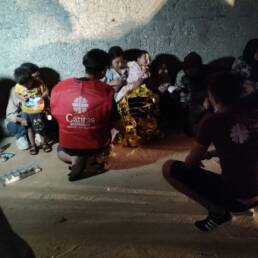We at Caritas Europa are concerned about the EU’s lack of solidarity towards the refugees arriving on its territory.
We escaped from death. We used to live as normal people in a normal country. We used to run our own business. We had a great and happy life; my wife, my children and the rest of my relatives. But we have lost everything now… During the war, I lost my brother, my father. I remember the terrorism of the war, the bombs and the dead bodies.
M., a 38-year-old Syrian refugee, met by Caritas in Greece
In our report entitled ‘Migrants and refugees have rights! Impact of EU policies on accessing protection’, we highlight the tragedy hundreds of thousands of people face when seeking protection in Europe. Women, men and children escaping war, repression and violation of human rights often turn to Europe in the hope of finding a safe haven. But many are instead confronted with bureaucratic hurdles, denial of protection and inconsistent reception standards across Europe, indicating a lack of solidarity.
In our report we insist on human-centred solutions to the migration situation. For instance, it is important to open more safe and legal paths for migrants to come to Europe. We believe that resettlement, humanitarian visas and family reunification are effective solutions to this end. Guaranteeing legal ways of entry can help save migrants lives at sea as well as put smugglers out of business.
With this report we also remind policy-makers that Europe has and needs migrants. For example, Germany will lose 5 million members of its workforce in the next 15 years and Italy will lose 3 million over the next decade. Migration, therefore, continues to be essential for Europe. In this context, we also call for a more adequate and complete EU legal framework, which takes into account specific groups of people, such as women, children and low-skilled migrants.
We based our report on the testimonies of migrants and the experiences of Caritas Europa organisations to remind everyone that migration is about people and not about figures, costs or budget. This is why we ask policy-makers to address this solidarity crisis in a humane manner.
It is all so heart breaking and surreal. There is dire need for medicine, baby formula, hygiene products, clothes. When people arrive in Lesbos, they get off the boats after a heroic battle feeling relief and they end up in a bigger nightmare.
Antony, Caritas volunteer in Lesbos
More information
Leïla Bodeux
Senior Policy and Advocacy Officer
Tel: +32 (0)2 235 26 55
Mob: +32 (0)478 585 409
lbodeux@caritas.eu




